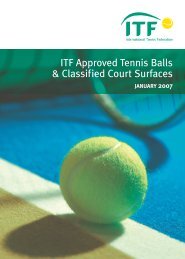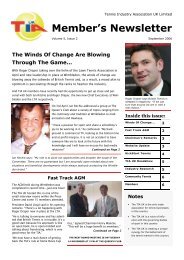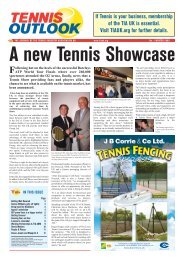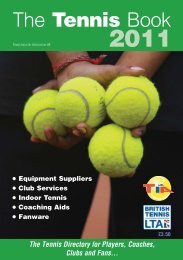Create successful ePaper yourself
Turn your PDF publications into a flip-book with our unique Google optimized e-Paper software.
<strong>Tennis</strong> Industry<br />
Grass Roots Development <strong>Review</strong><br />
Thursday 3 August, 2006<br />
The Queen’s Club, from 2 – 3.30 pm<br />
Guest Speaker<br />
Sue Mappin, Sue Mappin Consultancy<br />
BIOGRAPHY<br />
Sue Mappin, former LTA National Women’s Team Manager and currently Director of the Cliff<br />
Richard <strong>Tennis</strong> Foundation and a <strong>TIA</strong> <strong>UK</strong> Board member, is conducting a review into how<br />
grass roots tennis is delivered in Britain.<br />
She is uniquely placed to head up this comprehensive assessment of grass roots<br />
programmes that involves wide-ranging consultations across the country with Government,<br />
local authorities, schools and the commercial sector.<br />
A self-employed leisure consultant with extensive connections in the sport and leisure<br />
business, Sue was a Wimbledon semi-finalist who also represented Britain in the Federation<br />
Cup and Wightman Cup.<br />
She subsequently worked with the LTA with coaching schemes and encouraging young<br />
people into tennis, and in 1990 was appointed by the Sports Council to the Coaching <strong>Review</strong><br />
Panel. She also has extensive broadcasting experience.<br />
In 2003 she launched www.jobswithballs.com, the <strong>UK</strong>’s only sports focused online job search,<br />
careers resource and marketing network, to meet increasing demand from jobseekers and<br />
recruiters, both in the <strong>UK</strong> and abroad, and provide the sport and leisure industry with a<br />
simple, yet highly cost effective, one-stop recruitment and marketing service.<br />
SUMMARY NOTES<br />
Henry Wancke, Chairman of the <strong>TIA</strong> <strong>UK</strong>, welcomed those present and asked Sue Mappin to<br />
lead the meeting.<br />
SUE MAPPIN: -<br />
Thank you, Henry. I thought I should briefly outline the project which is called a ‘Grass Roots<br />
<strong>Tennis</strong> <strong>Review</strong>’ which I prefer to refer to as <strong>Community</strong> <strong>Tennis</strong>, covering - children, adults and<br />
people with disabilities.<br />
It’s a large brief covering probably the most important area of the game, the base.<br />
I rather liken it to a volcano… the lava (the performance player) needs to bubble furiously at<br />
the base of the volcano before it has the energy to come pouring out of the top. I have to find<br />
the way forward to get that cauldron bubbling again at all levels and also keep people in the<br />
game even if they don’t aspire to the Performance level.<br />
<strong>Tennis</strong> Industry Association <strong>UK</strong> Limited Phone 020 8249 3366<br />
48 Braeside, Beckenham, Kent BR3 1SU Email info@tiauk.org Fax 020 8249 5669<br />
Registered Office: 48 Braeside, Beckenham, Kent BR3 1SU Registered in England No 5345983
This involves CDOs (Club Development Officers), tennis managers, educators and a host of<br />
other people.<br />
My view is to compare tennis with other sports such as golf. As a child or an adult watching<br />
Tiger Woods win might encourage me to play and this involves joining a club, but I can’t<br />
because I have no handicap, rather like tennis!<br />
The difference is I can go and play at the local Municipal Pay-&-Play golf course where there<br />
is a golf pro and where I can hire clubs to play. He will explain the handicap system and offer<br />
me group lessons to learn how to play. At the first group lesson the pro will hit a shot down<br />
the fairway well over 250 yards because he is a low handicap golfer himself.<br />
In fact I could stay there forever and become a scratch golfer!<br />
Now, take tennis. If I watched Wimbledon and got equally inspired by Federer, Nadal and<br />
Mauresmo, I can’t join a club for a host of reasons so I go down to the local park and there’s<br />
the problem.<br />
In this country 80% of players are not members of a club, they play in parks and usually only<br />
once or twice a year around Wimbledon time.<br />
They find no coach in the park, no competitive structure and so they give up until next<br />
Wimbledon.<br />
Most adults in this country have played tennis before but are ‘not very good’ and are not<br />
encouraged.<br />
And for kids there are so many alternatives and they are probably a lot easier than trying to<br />
play tennis.<br />
It really is all about community tennis. If 80% of adults could be persuaded to take up the<br />
game on a regular basis and to compete locally our problems would be solved.<br />
We have more park courts than any other European country but we are not using them,<br />
although, of course, there are some good examples out there.<br />
Why do we have Club Development Officers? They should be <strong>Community</strong> <strong>Tennis</strong> Officers.<br />
The LTA pours money into clubs but the message from the coalface is that our system is way<br />
too complicated with too many initiatives such as Play <strong>Tennis</strong>, Raw <strong>Tennis</strong> and so on and far<br />
too few coaches at base level delivering sound technique.<br />
We need the governing body to be supportive of the game, not a dictatorship.<br />
The feeling is that the LTA needs to support good practice by rewarding it. Here’s an<br />
example: Steve Riley’s Will to Win set-up in six London parks is a place where people want to<br />
be. It has courts, coaching, a competitive structure, social events, a pro shop, café and so on.<br />
This is good practice that has be good for the tennis industry too because more people<br />
involved with the game spells more sales… the lava bubbles up!<br />
And there is bad practice too. A young boy who had just started playing in Sussex, and<br />
showed some ability was told he had to play at least 5 days a week and start travelling around<br />
the country to play tournaments. He began playing because it was fun and suddenly it all<br />
became far too serious so he gave up and moved on to cricket.<br />
We have got to get the base right because by delivering a sound base we have something to<br />
build on (back to the golfer!).<br />
The LTA needs to support good practice and begin moving these examples around the<br />
country.<br />
I hope to propose that the governing body offers a support system for the game at community<br />
level. We need more support and fewer initiatives and less paper!<br />
I had the opportunity to go to Russia for two days to meet a Professor of Sport who was<br />
recently was used by the Chinese to work with their tennis coaches, who now have produced<br />
5 women in the top 100 and will probably win gold in the Beijing Olympics.<br />
It was Anna who put together the Russian training programme in 1982 and you only have to<br />
look at the players they have since produced to know it has been a success.<br />
I am preparing a paper on the Russian visit which I am happy to share with you in due course.<br />
Page 2 of 7
I took a look at the Spartak <strong>Tennis</strong> Club which has produced the likes of Kafelnikov, Safin,<br />
Sharapova, Dementieva and so on. The club has 20 outdoor courts and just one indoor court,<br />
even with a typical Russian winter! Every court had groups of up to 8 players playing on them.<br />
Significantly there is no Mini <strong>Tennis</strong> in Russia – no special balls, no red, orange or green<br />
balls, just old regular tennis balls!<br />
There was a 4½ year-old girl there who could serve, smash, rally and volley, all with good<br />
sound technique. What is more she will benefit from the same coach from start to finish one<br />
who will travel to tournaments with her and plot her development.<br />
Spartak has 20 coaches – one male and 19 women. It’s a different culture obviously, but I’m<br />
sure we can learn from their successful system.<br />
So, to sum up, our focus needs to be on community tennis and if the LTA can be persuaded<br />
to act as a supporter of good practice, community tennis will see a growth for both the game<br />
and the tennis industry.<br />
Question and Answer Session<br />
Henry Wancke<br />
Sue Mappin<br />
Henry Wancke<br />
Ian Beswick<br />
Sue Mappin<br />
Henry Wancke<br />
Sue Mappin<br />
Henry Wancke<br />
Sue Mappin<br />
What is there at the LTA that we should hang onto or improved in<br />
terms of existing programmes?<br />
It all looks great on paper but it really isn’t happening. As I said, the<br />
good initiatives need to be supported within their own environment.<br />
Anna’s principle was never to pick out a child with ability until they<br />
reached the age of 12. Youngsters in Russia stay in their groups<br />
concentrating on agility and co-ordination skills and may not even hit<br />
a ball for 80% of their lessons.<br />
The LTA needs to offer support to the people and projects that are<br />
already doing well.<br />
I support everything you have said so far. The LTA do need to be<br />
more supportive. The first thing people ask you when trying to launch<br />
a new initiative is whether it is LTA approved, which to date has been<br />
nigh impossible to get. Perhaps now we can get some meaningful<br />
partnerships into tennis?<br />
Can I ask if the Russians select by physical attributes in any way?<br />
No, only when they get into the top squads do physical attributes<br />
come into the equation.<br />
<strong>Tennis</strong> is big out there. When you arrive at the airport there are<br />
advertisements featuring tennis in some guise or another all over the<br />
place. It’s one of the first things you notice.<br />
What about tournaments in Russia?<br />
They run tournaments every week but it is all very basic. Players call<br />
their own lines, drag the courts themselves and so on. They just get<br />
on with it.<br />
They also run lots of tournaments for adults but this is not as big as it<br />
is it, perhaps, in France or Belgium.<br />
The LTA has never really focused on getting adults back playing<br />
again, like they do in Holland, Spain and Sweden etc, where family<br />
tennis is key.<br />
Clearly the Russians are doing something right as they keep<br />
producing the players!<br />
So what you are suggesting is we focus on the ‘rusty rackets’<br />
syndrome and get people playing again?<br />
Precisely.<br />
Page 3 of 7
Peter Risdon<br />
Sue Mappin<br />
Peter Risdon<br />
Sue Mappin<br />
Peter Risdon<br />
Sue Mappin<br />
Peter Risdon<br />
Mini <strong>Tennis</strong> should be used as a teaching aid only and not as a be-all<br />
and end-all.<br />
Let’s start with the primary schools and get them competing within<br />
the school, then introduce inter-school competition with mixed teams,<br />
like a Little League, to create interest and demand.<br />
There are no gimmicks in France where all the programmes are<br />
sponsored by one company – BNP Paribas.<br />
If you look at the USTA website there is nothing about producing a<br />
great player. It’s all about health and fitness and socialising<br />
Bob Johnson (Solo Sports – Prince), who couldn’t be here today,<br />
says sales of tennis equipment and balls are down yet again.<br />
From a brand’s point of view there are far too many schemes being<br />
promoted as a so-called solution for growing the game.<br />
He’s right. The tennis industry should want to be a part of all this<br />
because if, say, Parks <strong>Tennis</strong> really took off, the opportunities would<br />
be extraordinary.<br />
You mentioned Wandsworth earlier. Are you aware of the Ron Gray<br />
Ladder which is a competition run by one man that attracts masses<br />
of players in the area? It started out in St George’s Park and is now<br />
very successful, called the South London <strong>Tennis</strong> League?<br />
I haven’t heard about that but I’ll make a note….<br />
On another point, surely there must be some good use for old tennis<br />
balls? Our club just throws dozens and dozens away…<br />
We are looking for good examples with a view to getting behind<br />
them. These sorts of initiatives deserve to be rewarded.<br />
There’s a problem too with our coaches who struggle over the bad<br />
winters and lose income.<br />
Les Mellor That’s not actually true. I have coached fulltime over the past 10<br />
winters without indoor facilities…<br />
Sue Mappin<br />
Henry Wancke<br />
Sue Mappin<br />
Just imagine, in Russia they only have one indoor court at the<br />
Spartak Club and have far more severe winters than us. You don’t<br />
hear the coaches making any excuses there. They just get on with it.<br />
How are you proposing to approach the parks?<br />
I have been checking out successful parks schemes such as Steve<br />
Riley’s, Tony Hawk’s Free-for-All campaign, programmes in the<br />
North East and Glasgow and others with a view to getting the LTA to<br />
offer appropriate support.<br />
Steve Riley’s Will to Win set up is interesting.<br />
He has taken over the tennis in several Royal Parks, including Hyde<br />
Park, Holland Park, Regents Park and Greenwich as well as in parks<br />
in Chiswick and Ealing. Everything is computerised, with pro shops,<br />
coffee shop, changing facilities and the places are buzzing. He wants<br />
indoor courts in Ealing and this is where the LTA can be of positive<br />
help.<br />
I spoke to him about setting up a similar programme in Beeston as I’d<br />
like to see the idea rolled out a bit. There is an ITI in Leeds, which is<br />
located on the top of a hill with no bus service, and there are six<br />
parks surrounding it. There are masses of kids in the area who would<br />
play in these parks if they could become community tennis centres.<br />
Some City <strong>Tennis</strong> Clubs seem to be working quite well but some are<br />
not and need to be looked at. The key is to make people feel they<br />
belong.<br />
Page 4 of 7
Richard Jones<br />
Sue Mappin<br />
Richard Jones<br />
Henry Wancke<br />
Sue Mappin<br />
Karen Fan<br />
Sue Mappin<br />
Les Mellor<br />
Sue Mappin<br />
Les Mellor<br />
Sue Mappin<br />
As we all know Wimbledon enthuses people and the age-old<br />
question is how do we keep people’s interest in tennis for the rest of<br />
the year?<br />
Could the LTA offer direct support to schools during the month of<br />
July to help sustain interest through until August? It would be a good<br />
start…<br />
That’s getting back to the LTA putting something on when the LTA’s<br />
expertise should really be directed towards helping to put a<br />
programme on by supporting it. What works well in Devon doesn’t<br />
necessarily work well elsewhere.<br />
People who like to work with large numbers at community level may<br />
require assistance to help them deliver good technique at this level.<br />
I’m talking about supporting through training of coaches, upgrading<br />
facilities, paying for equipment and so on to enable them to continue.<br />
Your comparison to golf is a good one. <strong>Tennis</strong> centres already exist<br />
and there are many courts in the parks, which ties in with the<br />
government’s initiative to re-generate park activities.<br />
It is imperative to make sure that tennis continues to be played in the<br />
parks as many courts are being converted to other use such as skate<br />
boarding and so on.<br />
You mentioned disability tennis…<br />
I’ve spoken at some length to Sue Wolstenholme and Lynn Parker<br />
and this is not an easy area. Coaches need specialist training,<br />
especially for kids with learning disabilities.<br />
We have made a start on this with the Cliff Richard <strong>Tennis</strong> Trail and<br />
put together a training course for coaches so wherever we now visit<br />
we are working with kids with disabilities. It is very rewarding for the<br />
kids and the coaches.<br />
We will be hosting the Para Olympics in 2012 and so must make<br />
sure that we introduce kids to tennis. It is a fantastic opportunity for<br />
them and I am hoping the British <strong>Tennis</strong> Foundation will accept the<br />
challenge.<br />
I am wondering how SMS can help? How do you rate the importance<br />
of research in terms of measuring response to initiatives and so on?<br />
We do a lot of work with tennis and such bodies as the LTA, ITF and<br />
USTA, and some time back identified the ‘leaky bucket’ syndrome.<br />
All feedback has value and we have to look at the problems from all<br />
perspectives.<br />
The USTA has Cardio-<strong>Tennis</strong> and Aces <strong>Tennis</strong>, both of which are<br />
fantastic and it would be interesting to measure the impact of these.<br />
I’m certainly interested in getting together with you, perhaps towards<br />
the end of August?<br />
With regard to Moscow, what do coaches over there see themselves<br />
as?<br />
The ones I met felt very much part of their club, they were proud to<br />
be part of Spartak. The club has now been bought by a private<br />
person so they were a bit unsure about their future.<br />
My feeling is that coaching in this country needs to be promoted as a<br />
respectable profession…<br />
Interestingly, the Russian coaches had mostly come through the<br />
junior ranks and so they had created their own apprenticeship<br />
scheme, as has Steve Riley.<br />
Page 5 of 7
Les Mellor<br />
Sue Mappin<br />
Henry Wancke<br />
Sue Mappin<br />
Barbara Wancke<br />
Les Mellor<br />
Unfortunately the ground rules for coaches keep changing at the<br />
LTA. Is this part of your remit?<br />
Well, in a way but there are no quick fixes for these things.<br />
Will your recommendations to the LTA be based on existing<br />
programmes then?<br />
Why re-invent the wheel? Nigel Long, in Basingstoke, has produced<br />
his own programme with the local authority and created his own<br />
training programme alongside. It works.<br />
The LTA has been the brand for far too long, when it should all be<br />
about <strong>Tennis</strong>.<br />
You mentioned Parklangley earlier. Here is a club that has taken<br />
over all the local park courts in the area because its coaching<br />
programme outstripped its own facilities.<br />
It became a template in the LTA manuals, promoting 6 per group but<br />
you have to be careful in setting a standard because everywhere is<br />
different.<br />
The LTA stopped recommending coaching rates about 10 years ago,<br />
which has created problems because the paying public has no idea<br />
what a coach is worth. That isn’t helpful.<br />
Sue Mappin I have a friend whose daughter goes to ballet lessons and pays £6<br />
an hour to be taught by a top ballerina. When she sends her son to<br />
the local park, she gets charged £38 an hour for a coach who can’t<br />
play… that doesn’t seem right.<br />
Richard Jones<br />
Sue Mappin<br />
Richard Jones<br />
Sue Mappin<br />
Richard Jones<br />
Henry Wancke<br />
Sue Mappin<br />
Henry Wancke<br />
By the way, ballet is very good start for tennis because it teaches<br />
balance and coordination.<br />
I asked some Russian kids why they started playing tennis and<br />
mostly it was because of their parents, most of whom played one<br />
sport or another.<br />
I corresponded with Ann Pankhurst some time ago about the type of<br />
coaching materials she considered ‘good practice’ and she told me<br />
this was not their role. I think it should be. If you can’t get good<br />
practice advice from the LTA, who can you get it from?<br />
If you go to the USTA website you will find lots of advice and<br />
encouragement about involving people in the game.<br />
The FFT in France produces a directory covering all products and<br />
services related to tennis that is very helpful.<br />
Can I see that?<br />
I’ll get you a copy. It covers every aspect of running tennis in France.<br />
Well, it has all been very enlightening and we really appreciate you<br />
taking the time to discuss all this with us, Sue.<br />
It’s clear that there is plenty more to say on this subject and I hope<br />
that we can pass on further thoughts to you over the coming weeks.<br />
Certainly. Please let me know of anyone who is doing a fantastic job<br />
out there with a particular project.<br />
On that note I’d like to thank you all, particularly you, Sue.<br />
_________________________<br />
Started: 14.15 Hours<br />
Notes taken by Barbara Wancke<br />
Ended: 15.40 Hours 08 August, 2006<br />
Page 6 of 7
In Attendance<br />
o Katie Alderman, SMS<br />
o Paul Angell, Vantage Sport International Ltd<br />
o Ian Beswick, TAB Services<br />
o Jan Booth, Sunbaba<br />
o Karen Fan, SMS<br />
o Robert Fuller. The Silver <strong>Tennis</strong> Collection Ltd<br />
o Richard Jones, The <strong>Tennis</strong> Gallery<br />
o Mike Lynch, National Manager, BTCA<br />
o Sue Mappin, The Cliff Richard <strong>Tennis</strong> Foundation<br />
o Les Mellor, Treasurer, BTCA<br />
o Peter Risdon, Celebrity <strong>Tennis</strong> Ltd<br />
o Barbara Wancke, <strong>Tennis</strong> Interlink Ltd<br />
o Henry Wancke, <strong>Tennis</strong> Today<br />
Apologies received from<br />
o Corinne Anysz, Love All<br />
o Clive Asprey, Aldershot <strong>Tennis</strong> Centre<br />
o Robert Boyd, sportsequip.co.uk<br />
o John Bushell, SMS<br />
o Dennis Cunnington, <strong>Tennis</strong> Today<br />
o John Freeman, K-Swiss<br />
o James Hawkins, Asics <strong>UK</strong> Ltd<br />
o Bob Johnson, Solo Sports (Prince)<br />
o Duncan Kettell, Milliken<br />
o Gordon Lazenbury, Sportsense Ltd<br />
o David Lloyd, President<br />
o Peter Occleshaw, Life Vice President<br />
o Irene Rhys-Evans, Robert Fuller Memorabilia<br />
o Keith Sohl, Sutton <strong>Tennis</strong> Academy<br />
o Sarah Swanick, Doe Sport Ltd<br />
o Chris Trickey, SAPCA<br />
o Ian Wood, Ian Wood Sports<br />
o Keiichiro Yanagi, Yonex <strong>UK</strong> Ltd<br />
Please feel free to contact Sue Mappin at the following address:<br />
Sue Mappin<br />
The Sue Mappin Consultancy<br />
Harley House<br />
PO Box 46C<br />
Esher<br />
Surrey<br />
KT10 0RB<br />
Tel: 01372 470648<br />
Fax: 01372 470645<br />
Email: sue.mappin@smcandassociates.com<br />
Page 7 of 7











